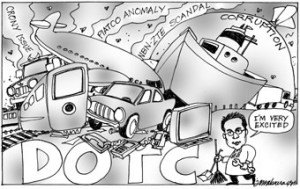The so-called Binay formula for burying the refrigerated remains of the late dictator Ferdinand Marcos is a cautionary lesson in, and a sorry example of, the self-perpetuating aspects of our worst political traditions. Presented with an opportunity to exercise leadership on a matter of moral, national and historical importance, Vice President Jejomar Binay opted, merely, to be political.
His formula—burial with military honors, but not at the Libingan ng mga Bayani—is still under study by President Aquino, but Binay has already presented the proposal as being fundamentally an essential and necessary compromise. He called the plan “very balanced,” with “all sides considered.” In other words, a gift of the political art.
A number of people have also described the formula as Solomonic, that is, a difficult but ultimately wise decision. This view, however, misunderstands what Solomon, the Old Testament king who acquired a reputation for wisdom and unerring fairness, actually did in that famous dispute of the two rival mothers. When Solomon ruled that the baby claimed by the two women should be cut in half, he did not mean to stop there. (Indeed, if he did, he would be remembered today as despotic and unjust.) The preliminary ruling was meant to identify the real mother, who naturally did not want to see her child hurt. Only then did Solomon actually decide the case, recognizing the claim of the woman who had renounced it in order to save the life of her child.
The problem with the Binay formula, thus, is that it proposes a cut-it-in-half approach—and stops there. (If it comes to pass, it will be remembered as honoring a despot, and deeply unjust.)
It was precisely because the President saw the burial as part of the tangled destinies of the Marcos and Aquino families, and their common fate as part of the country’s complicated history, that he asked Binay to handle the issue and recommend a solution. We dare say he did not expect to be given a political formula.
Instead of seeking balance, Binay should have chased context: Who is Marcos, and what is he in Philippine history? Where are the experts who can refute the evidence of massive fraud behind his bogus medals and alleged military exploits? Even more to the point, what did Marcos do to the military? He turned it into his own private army; he set back the professionalism of the armed services by at least a generation; he abused the country’s soldiers to perpetuate himself in power. For all this and more, the Armed Forces of the Philippines is supposed to give him full honors?
It was precisely because of the issue’s national import that Mr. Aquino assigned it to a high official with a national (and independent) mandate. We dare say he did not expect to be told by Binay, in so many words, that the national is only the political.
Instead of seeking compromise, Binay should have demanded the fullest accounting: Where did Marcos source his great and unexplained wealth? How did he reach those disastrous decisions that led to the Bataan Nuclear Power Plant, the 11-digit foreign debt, the hijacking of the coconut industry, and so on ad nauseam? What did Marcos know about the assassination of Ninoy Aquino, and when did he know it? In his two decades in power, Marcos redefined the national interest in his own image. Today, the national interest demands that a true picture of Marcos’ misdeeds, not an official fudging for future electoral considerations, be made, and set in stone.
Not least, it was precisely because the President sensed that the Marcos burial is ultimately a moral issue that he sought to have its solution placed outside normal political channels. We dare say he did not expect to see it treated as business as usual.
Instead of seeking “unification” (the same objective of the Marcos family, whose home province Binay carried in the last election), the Vice President should have pursued justice. If he did, he wouldn’t have said the following: “Every opinion from every person who responded to the survey [that he conducted] was given consideration.” To this an aggrieved nation has only one reply: What about the thousands killed, the tens of thousands of human rights victims, the hundreds of thousands dislocated by a predatory economy, the millions who showed up day after day at Edsa? Have they, too, been given due consideration?
To bury Marcos with military honors is a moral, national, historical outrage.


